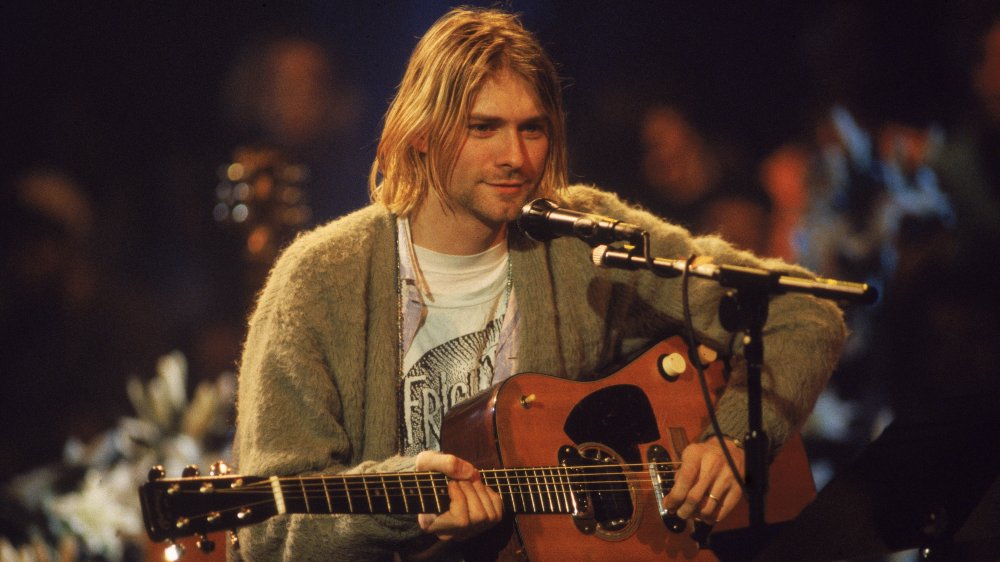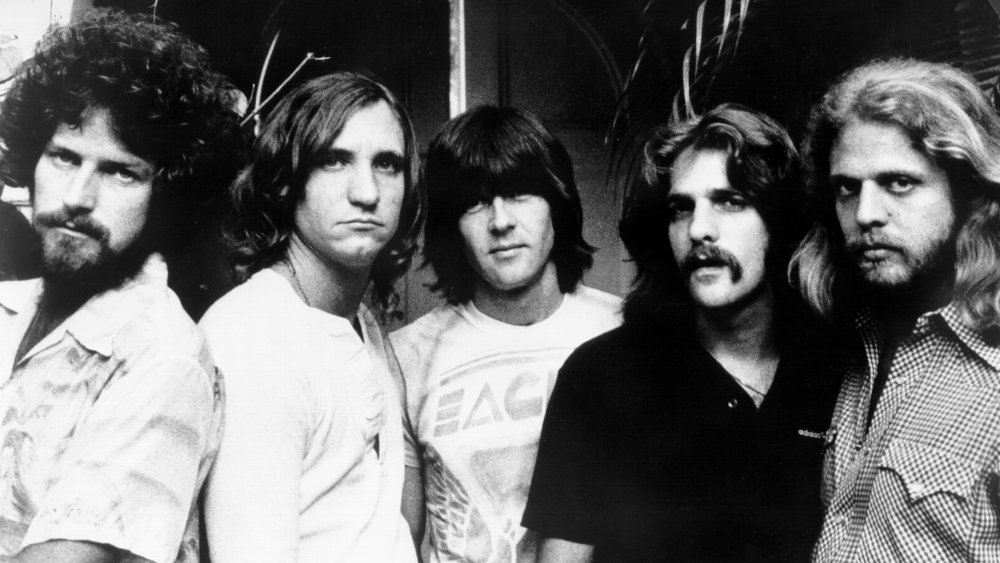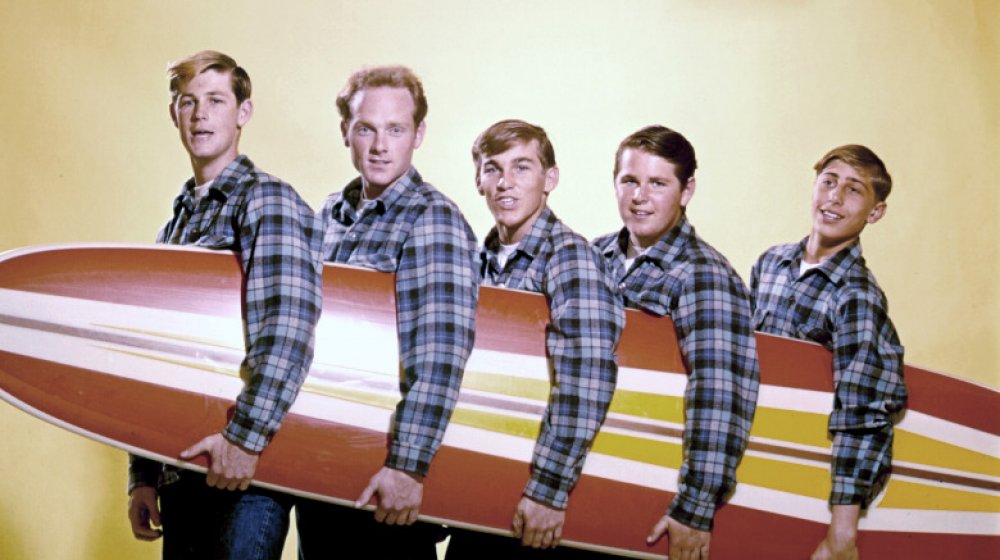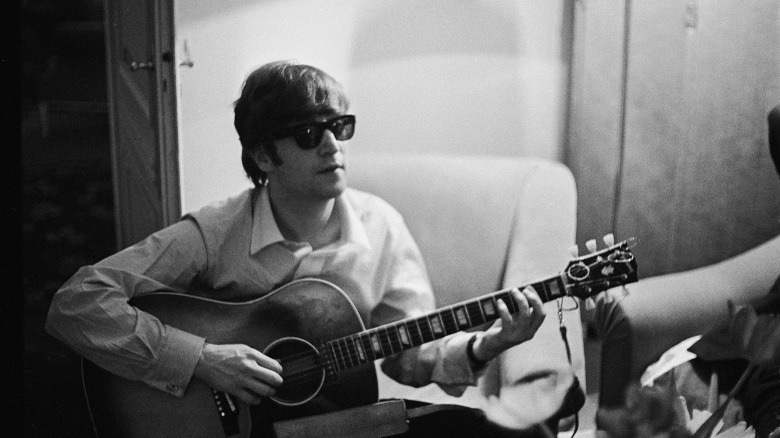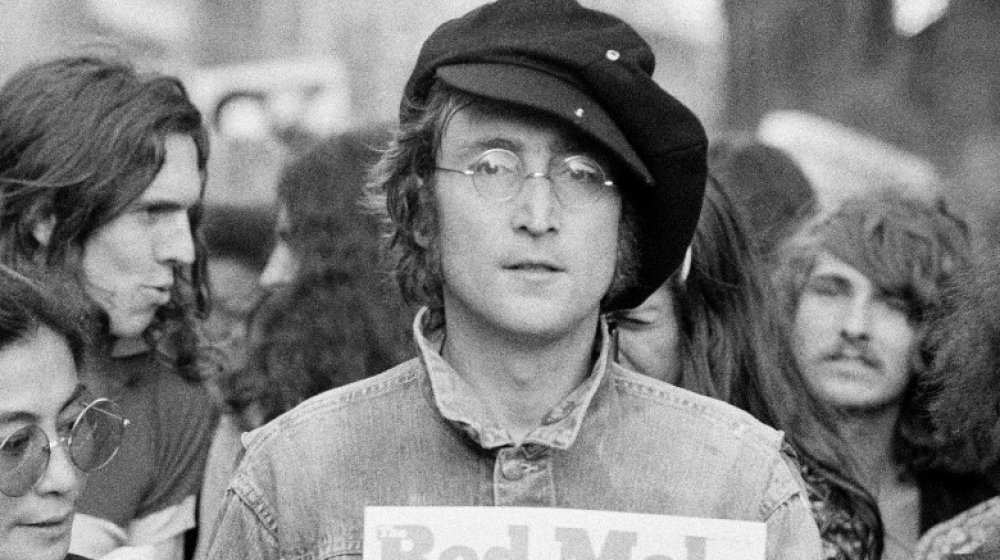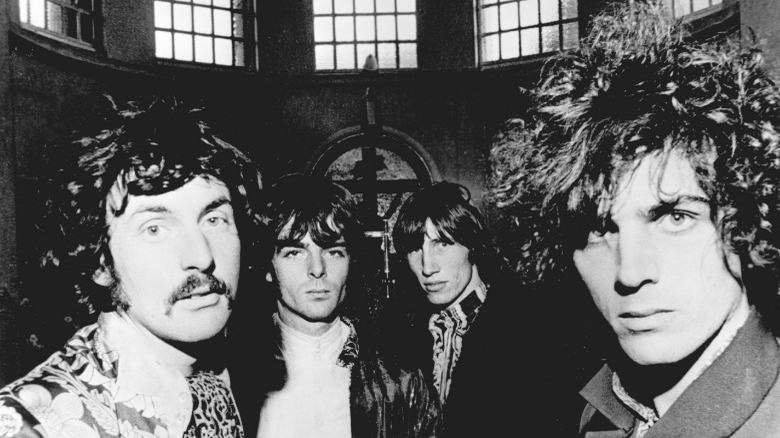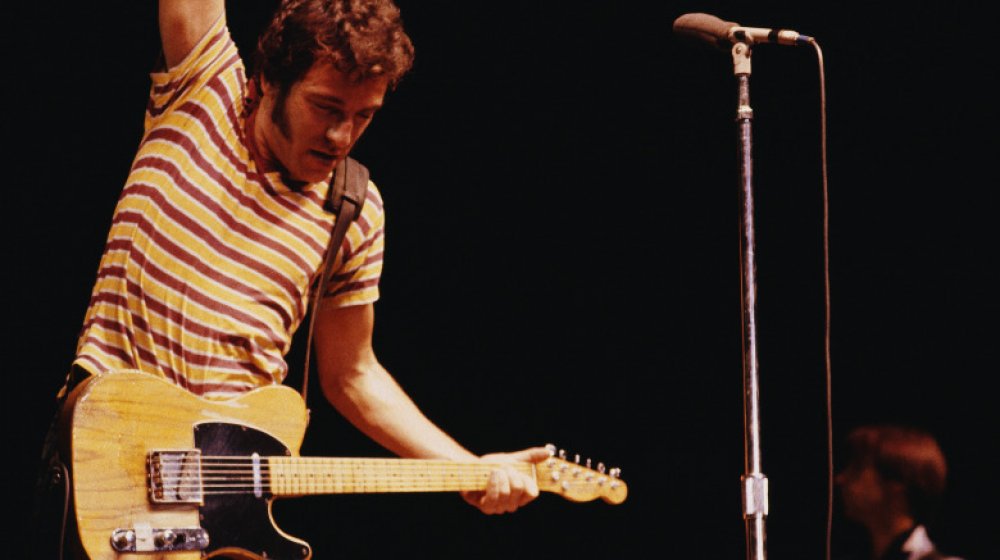Why These Legendary Songs Were Never Finished By Bands
A subject that doesn't often come up when we talk about pop music and our favorite artists is the pressure to produce material. When Spotify's CEO Daniel Ek suggested that musicians needed to work harder and could no longer release music every "three to four years" and still make a living with their work, the backlash from those musicians was swift and vocal. Songs, after all, are not widgets. They take time and creative energy.
Which is why unfinished and unreleased songs by famous, successful artists capture the imagination. With all the time, energy, and expense involved in writing and recording a song, the pressure to release anything that's even close to finished must be incredible. The decision to hold a song back for years or even decades — like the songs on this list — means there's a story behind each of them. The reasons why these legendary songs were never finished by bands and solo artists are as varied and unexpected as the songs themselves, but one thing is certain: The chances that any of them will ever be officially finished and released are getting slimmer every day.
You're Really High, Aren't You by The Eagles
In 1976, the Eagles released Hotel California, an album that became a massive hit for the band, spawning multiple hit singles and selling millions of copies. The band spent months working on the album and then spent months on the road supporting it with a tour. The incredible success of Hotel California strained the already fragile relationships in the band, and the pressure they felt to match or exceed that success was immense. As Ultimate Classic Rock reports, the band went into the studio in 1977 to begin recording what would be their last album before their first breakup, The Long Run, intending it to be a double album. Eighteen long months later, unable to come up with any more quality songs, they essentially gave up and released what they had. There is one song that has become infamous due to its unusual title: "You're Really High, Aren't You."
In an interview with Rolling Stone, drummer and lead singer Don Henley called that "one of the many joke titles we came up with." It's not unusual for bands to give unfinished songs placeholder titles until they finalize the lyrics.
According to Fox News, guitarist Don Felder says the song was closer to finished than Henley remembers, but they gave up on the album before it could be finished. In other words, the band broke up before the song could be completed. He eventually reworked it into the title song on the soundtrack to the film Heavy Metal.
Verse Chorus Verse by Nirvana
Kurt Cobain tried like heck to use the title "Verse Chorus Verse," applying it to several compositions throughout his tragically brief life. In a way, it's the ideal Nirvana song title, expressing a deep disdain for radio-friendly unit shifter songs through angry power chords, and as Goldmine Magazine reports, it was intended to be the title of a double live album the band planned to release in 1994, before Cobain's suicide changed everything. According to AllMusic, they eventually used the title on a song that appeared as a hidden bonus track on the compilation album No Alternative.
But fans refer to that particular song more commonly as "Sappy," because there is a legendary unfinished song by the band also called "Verse Chorus Verse." As Rolling Stone notes, the song was worked on during the sessions that produced Nevermind, and it got to a pretty advanced demo stage before the band abandoned it. In fact, the demo is so polished that it's actually surprising that the song wasn't included on Nevermind. Less mystifying is why it wasn't included on the band's follow-up, In Utero, which features a drastically different sound and songwriting approach. Still, with a song so close to completion, fans can only imagine what might have been had Cobain and the band's story been less tragic.
Barnyard Suite by the Beach Boys
Smile has become firmly established as one of the most legendary unreleased albums of modern pop cultural history, even though it was finally officially released in 1993, nearly 30 years after the initial recordings. Written by Brian Wilson as his schizoaffective disorder became increasingly disruptive, Stylus Magazine reports that the intention was to create songs from interlocking pieces, similarly to the way the band's massive hit "Good Vibrations" had been created.
This style of composition has made figuring out what was left in and what was taken out a job for a musical detective. Smile was intended to be a musical exploration of the American experience, a conscious effort to counterbalance the influence of British sensibilities dominating the American music charts at the time. One concept became known as the "Barnyard Suite," a series of interlocking pieces of music. As author Domenic Priore writes, there were four songs in "four short pieces" that would be combined.
But even as other material from the Smile sessions was released, repurposed, or leaked, the "Barnyard Suite" remains mysterious. According to Wilson himself, "We never finished that one. We got into something else," which might be code for substance abuse and mental illness. On the other hand, Stylus Magazine speculates that the "Barnyard Suite" eventually evolved into a song called "I'm in Great Shape."
On, Wisconsin by Bob Dylan
In 1961, Bob Dylan was 20 years old and almost completely unknown outside of New York City, where he'd been playing at small clubs in Greenwich Village. As Rolling Stone reports, Dylan had spent some time in Madison, Wisconsin, after dropping out of college. He tried to make an impression in the local folk music scene there before giving up and moving to the Big Apple.
When Dylan signed a recording contract with Columbia Records in 1961, he went to a local New York studio to record his debut album. As the Chicago Tribune reports, it was there that he jotted down the lyrics to a song called "On, Wisconsin." He never recorded the song or even finished the lyrics — as Rolling Stone notes, he gave the sheet of paper to his friend and former roommate Peter Crago, and for decades, the song was forgotten.
And then it was unforgotten in spectacular style. The lyrics were put up for auction in 2017, and a Milwaukee-based musician named Trapper Schoepp saw the lyrics when the story hit the news. Inspired, Schoepp sat down and finished the song, smoothing out Dylan's lyrics and putting them to music. Incredibly, as the Tribune reports, the finished song was passed to Dylan himself — who not only approved but even gave Schoeep an official co-writing credit on the song, as well as permission to release it.
You Always Hurt the Ones You Love by Amy Winehouse
Amy Winehouse's tragic end only underscored her incredible talent. Her untimely death came just as her third album, her follow-up to the massive hit Back to Black, was going to be recorded. The troubled singer had recorded 14 demo songs she intended for that album — but as Rolling Stone reports, after her death, those demos were destroyed. David Joseph, CEO of Universal Music U.K., disposed of the recordings to ensure that no attempt was ever made to turn those rough demos into a new album solely to make some quick money. Describing it as "a moral thing," Joseph said, "Taking a stem or a vocal is not something that would ever happen on my watch. It now can't happen on anyone else's."
One of those 14 songs has become legendary because a ghostly trace of it still exists. As Rolling Stone also reports, in the A24-produced documentary Amy, the singer can be heard reciting the lyrics to a song titled "You Always Hurt the One You Love." The handwritten lyrics have some chords accompanying them, indicating, sadly, that the song had at least a rough arrangement worked out and could have been recorded quite easily. This haunting moment is the only glimpse we'll ever get into what that third album could have been and, so far, is the only scrap of those destroyed songs known to survive.
Madman by John Lennon
The Beatles have been one of the most written-about, analyzed, and influential rock bands in history. So much of the material they initially left off of albums has been officially released that it might be hard to believe there's any material left behind. When you live in a world where a song like "What's the New Mary Jane" got an official release, what could possibly be left?
That's one reason why fans fixate on "Madman." As The Beatles Bible notes, John Lennon put considerable time into the song during the 1969 "Get Back" sessions that eventually morphed into the band's final album, 1970's Let It Be. These sessions were chaotic, as the band was on the verge of a final breakup, but Lennon returned to "Madman" several times.
As authors Doug Sulpy and Ray Schweighardt write, at one point, John Lennon and Paul McCartney began a collaboration, with John singing a verse of the song and Paul offering background vocals. Then Lennon appears to have become bored with the song, and it was abandoned — although Lennon wound up borrowing bits of it later on. As author Richie Unterberger writes, "Madman" sounds a bit like a cross between later Beatles songs "Hey Bulldog" and "Mean Mr. Mustard," offering the possibility that Lennon didn't so much abandon the song as evolve it.
Now and Then by John Lennon
The Beatles Anthology project during the mid-1990s is a legendary moment in music history in and of itself. The three surviving members of the band came together for first time in decades to work on formalizing their legacy — and creating a small amount of new music.
But Paul McCartney, Ringo Starr, and George Harrison agreed that they couldn't work together as a trio — John Lennon, who was assassinated in 1980, had to be part of whatever music they produced. As The Beatles Bible explains, Paul McCartney reached out to Lennon's widow, Yoko Ono, and she provided him with four unfinished Lennon songs that he'd recorded on a "boom box" in his apartment. (One of them, "Grow Old with Me," had been released in rough form on a posthumous Lennon album in 1984). The three musicians famously worked with the low-quality Lennon demos to create the songs "Real Love" and "Free as a Bird," the first new Beatles music in more than two decades at the time.
The fate of the fourth song, "Now and Then," is less satisfying. The three Beatles worked on "Now and Then" in the studio in hopes of making it the third new song, but as Ultimate Classic Rock reports, there just wasn't enough material to work with. Producer Jeff Lynne says there was a chorus, but no verses, and after creating a rough backing track, the band abandoned it. It seems unlikely we'll ever hear a final version of the song.
Schoolboy Blues by the Rolling Stones
Sometimes known by another, much less polite title, this song has the distinction of being not just the most infamous unreleased Rolling Stones song but of being paired with one of the most infamous unreleased films as well.
As Pop Matters reports, the song came in 1970 because the Stones owed their record label, Decca, one more song on their contract. The band wanted to start their own label and be free from corporate limits, but first, they had to satisfy their obligation to Decca because the company refused to let it slide. Irritated, the Stones tossed together a simple blues song that sounds like it was recorded in a hurry — and Mick Jagger penned some pretty shocking lyrics to go along with it. The lyrics make it obvious that the Stones never expected the song to be released — and it never has been, officially. As Cheatsheet notes, in 1983 Decca accidentally included it in a box set released in Germany. The set had to be recalled and the song removed.
The song inspired the title of the infamous documentary made about the Stones during their 1972 American tour. The film depicts the band in a pretty shocking light, documenting drug use and other behavior the band decided it didn't want publicized. The Stones sued to stop the film's release, and to this day, it has never been officially — or legally — released. Just like the song that plays over its opening credits.
Blue Water Baboon Farm by the Dave Matthews Band
Some bands work on their music more or less privately, rehearsing and shaping compositions in the studio and then releasing new material every few years. Other bands do a lot of that experimenting, rehearsing, and shaping right out in public while on tour. The Dave Matthews Band is an example of the latter, and devoted Dave fans are often amused when casual fans get excited about a "new" song they've been familiar with for a decade.
While a lot of popular live songs have been transformed into studio versions, there are a handful of legendary, popular Dave songs that have never had an official release. One of the most mysterious is "Blue Water," a.k.a. "Blue Water Baboon Farm." As DMBAlmanac notes, "Blue Water" was first composed around 1990 and was extremely popular among the fans. It was almost a staple at concerts for a few years and then slowly fell off the set lists, with short resurgences here and there. (Writer Matt Norlander states that it hasn't been played in full since 1995.) DMBAlmanac also notes that in 2007, the song was named as the one fans missed the most.
There's no explanation for the song's disappearance, and until it's released in a definitive version, it has to be considered still under construction and unfinished.
Baluchitherium by Van Halen
In one sense, "Baluchitherium" is finished. It appears on Van Halen's 1995 album Balance, after all, though it's a deep instrumental cut that only the biggest fans are really familiar with. But there's a reason the song's an instrumental: It's technically unfinished.
As Rolling Stone reports, the making of Balance was a contentious process for the band. After pulling off a rock 'n' roll miracle replacing legendary frontman David Lee Roth with Sammy Hagar and still dominating the music charts, the Van Halen magic had finally begun to fade. As Ultimate Classic Rock reports, tensions were high during the recording of the album — and arguments about lyrics were very common, as Hagar and the rest of the band began to have diverging creative visions. In fact, Hagar left Van Halen shortly after the album's release.
Also according to Ultimate Classic Rock, "Baluchitherium" was one of several instrumentals intended to have lyrics, but things got so bad between Eddie Van Halen and Sammy Hagar that the latter simply refused to write lyrics and lay down a vocal track. Van Halen, in typical fashion, simply mastered the instrumental and included it on the album almost as a taunt to the singer, and the sessions ended before any rapprochement could happen. Van Halen stated in a 1995 interview with Guitar World that the band decided the song worked best without vocals — though he also passive-aggressively mocked Hagar's work ethic at the same time, implying that Hagar couldn't keep up with his creative output.
Have You Got it Yet? by Pink Floyd
The story of Syd Barrett and Pink Floyd is a tragedy. Fans of the band's 1970s and 1980s heyday are often surprised to hear their earlier 1960s work, which is extremely psychedelic and often bizarre and whimsical. The difference is the main creative force behind the songs: In its earliest incarnation, Syd Barrett was Pink Floyd's driving force. After his mental deterioration, Roger Waters stepped forward and took control, resulting in a very different approach.
According to author Julian Palacios, the breaking point between Barrett and the band was the song "Have You Got it Yet?" In 1968, tensions in Pink Floyd were high due to Barrett's increasingly strange and combative behavior. Barrett brought the song into the studio and gathered the band to teach it to them. But he kept changing the arrangement, altering the chord structure and other aspects of the song so that his bandmates could never keep up. Then Barrett would ask, "Have you got it, yet?" and delight in the band's increasingly frustrated responses.
Roger Waters admits he didn't catch on for over an hour. Night Flight reports that when the bassist did finally figure out that learning the song was deliberately impossible, he put down his instrument, left the studio, and vowed to never work with Barrett again. The song was never finished.
Electric Nebraska by Bruce Springsteen and the E Street Band
Electric Nebraska is actually finished. Sometimes referred to as the "holy grail" of bootlegs, this full-band version of Bruce Springsteen's classic 1982 album Nebraska has never been released in any form and may not ever be.
In January 1982, Springsteen was coming off a long hot streak after his 1975 breakthrough Born to Run. His follow-up to that album, Darkness on the Edge of Town, had done well, and 1980's The River became his first #1 album. As Ultimate Classic Rock reports, Springsteen began working on new material with a four-track recorder, intending to put together rough demos he could take to the E Street Band for full arrangements. But the songs he wrote weren't the bombastic, operatic anthems he usually produced. They were spare, dour songs about death and loss.
Springsteen brought those demos into the studio with the band in February. As Rolling Stone reports, the E Street Band recorded the whole, complete album — but Springsteen didn't like it. He came to realize that the "demos" he'd recorded were actually perfect as they were, so he put the studio work aside. That unfinished full-band version of Nebraska exists, somewhere, but Springsteen has never indicated that he'll ever release it.
